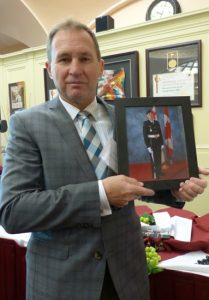
Joe Tilley recalled the day his son died. He recounted the scene in front of an audience that knew the story. He described the day two years ago, when his wife answered a heavy knock at the front door. The fact that a police officer was knocking didn’t surprise Penny-Claire Tilley. Their son, Spencer, had had several run-ins with the law. But this police visit seemed different.
“You’re here to tell me my son’s dead, aren’t you,” Penny-Claire Tilley said.
“Yes,” the officer said solemnly.
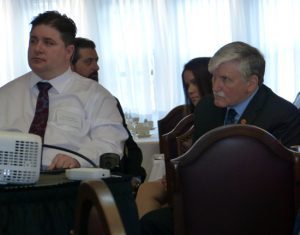
And in the audience (including representatives from Uxbridge) at a special breakfast on Parliament Hill, last Tuesday morning, Spencer’s mother began weeping as her well-known broadcaster husband Joe painted the picture of the last day of their son’s tormented life – Oct. 8, 2014. According to Joe, his son had fallen prey to the side effects of fentanyl, a highly potent oxycodone painkilling drug, and died by suicide. And Joe Tilley’s audience was sympathetic to his tragic story because he was the keynote speaker at the 3rd Annual Sam Sharpe Breakfast exploring Veterans’ Mental Health and Wellness on May 5.
“Nobody wanted to quit (using fentanyl) more than Spencer did,” Tilley said. “But playing with such drugs is like Russian roulette.”
The roulette game, Tilley said, began when his son suddenly abandoned a plan to study art and joined the military. Training in the signals section at Canadian Forces Base Petawawa, Spencer seemed to be getting his life in order, until the family suddenly got word the son was in jail over abuse of oxycodone drugs. Thus began the young man’s steady downward spiral into addiction, repeated terms of incarceration and a recurring self-sense of worthlessness. The family later gained access to Spencer’s diaries. He seemed to know what was wrong even if the system didn’t.
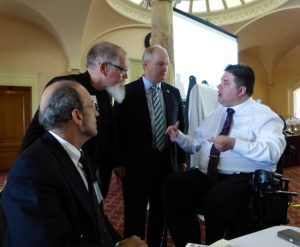
“In the (military) detention barracks I’m watching my health deteriorating,” said Joe Tilley, reading from his son’s journal. “I don’t feel of any value. (The system) isolates addicts when we need to be treated and incorporated.”
That’s what this year’s Sam Sharpe Breakfast was all about – acknowledging that mental health issues are treatable, while never stigmatizing those receiving that treatment. Among the others addressing the breakfast, host/veteran and Member of Parliament for Durham, Erin O’Toole, introduced TSN broadcaster Michael Landsberg. While not connected to a military experience, Landsberg’s recounted his own battle with depression and mental health stigma. He called it his professional calling; and indeed, his work with Bell Canada’s “Let’s Talk” is just the latest in his efforts to raise the profile of PTSD and other mental health issues. His bio-documentary, “Darkness and Hope: Depression, Sports and Me,” was nominated for a 2013 Canadian Screen Award.
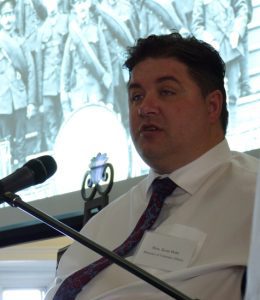
“Since then,” he said, “I haven’t shut up,” he said. “I’m sick, I tell people, not weak. (Our wish is) to have an impact, to reach and help that one lonely person.”
Kent Hehr, the new minister of veterans’ affairs addressed that issue as part of the breakfast. No stranger to adversity, the minister spoke from his motorized wheelchair. Just before his 22nd birthday, Hehr, riding in a friend’s car, was hit by a drive-by shooter. The gunshots left him paralyzed physically, but didn’t stem his ambitions; he completed a bachelor of Canadian Studies at the University of Calgary, and in 2001 a bachelor of law; in 2008 he won a seat in the Alberta Legislature, shadowing the provincial portfolios of justice, finance and education; he was elected federally and appointed veterans’ affairs minister in 2015. At the May 5 breakfast, Hehr reiterated his government’s pledge to re-open service offices for vets across the country and to invest $100 million to expand support for veterans’ families and $20 million for vet care centres.
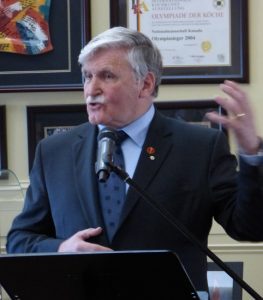
“Talking about mental health is not a sign of weakness, but of courage,” Hehr said.
There is perhaps no greater symbol of bravery in the face of post-traumatic stress disorder than the co-host of the Sharpe Breakfast, L/Gen and Senator Roméo Dallaire. While his remarkable story of commanding the United Nations Assistance Mission in Rwanda in the midst of tribal genocide is widely known, Dallaire’s continuing struggle with the sickness is not. He accused the system – military and political – of not understanding the needs of veterans coping with PTSD. He described poor mental health among vets, not as a medical problem, but a leadership problem. He called on current military brass to “save the sufferers and stop the unnecessary casualties,” now as many as 54 Canadians who have died by suicide since the end of the Afghanistan war.
Ultimately, L/Gen Dallaire revealed his own PTSD dilemma. He explained that night time is toughest for soldiers disabled by stress. And so he took the advice of a physician to medicate against the nightmares.
“But I need your dreams,” Dallaire’s psychiatrist complained. “It’s the only way to treat you.”
Like the entire military PTSD issue in Canada, until the treatment is applied in the right places, as Dallaire said, “we’ll continue to take casualties.”
I’m very sorry to learn the loss of Joe Tilley’s son, very sad ending. I still miss Joe’s sports report and the call, “Sports coming up!” I also miss Lance, his never ending work on backyard hockey rinks, and the annual Christmas serenading. Wish you both the best. John.
My deepest condolences Joe and family – taking the pain and challenging it towards trying to help other people. Really miss your ”sports team” at CFTO it hasn’t been the same since you all left.
Thanks for sharing your story Joe.